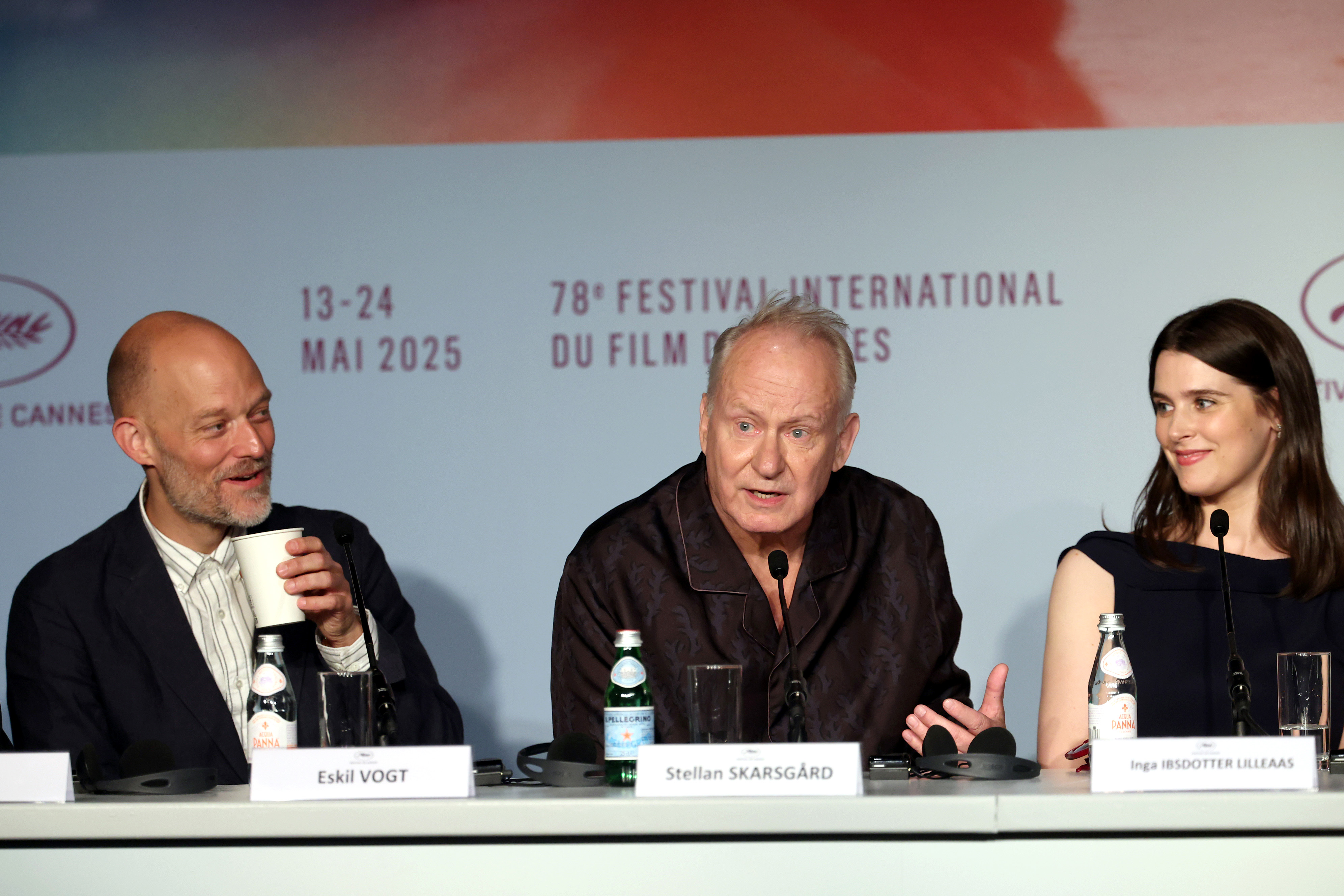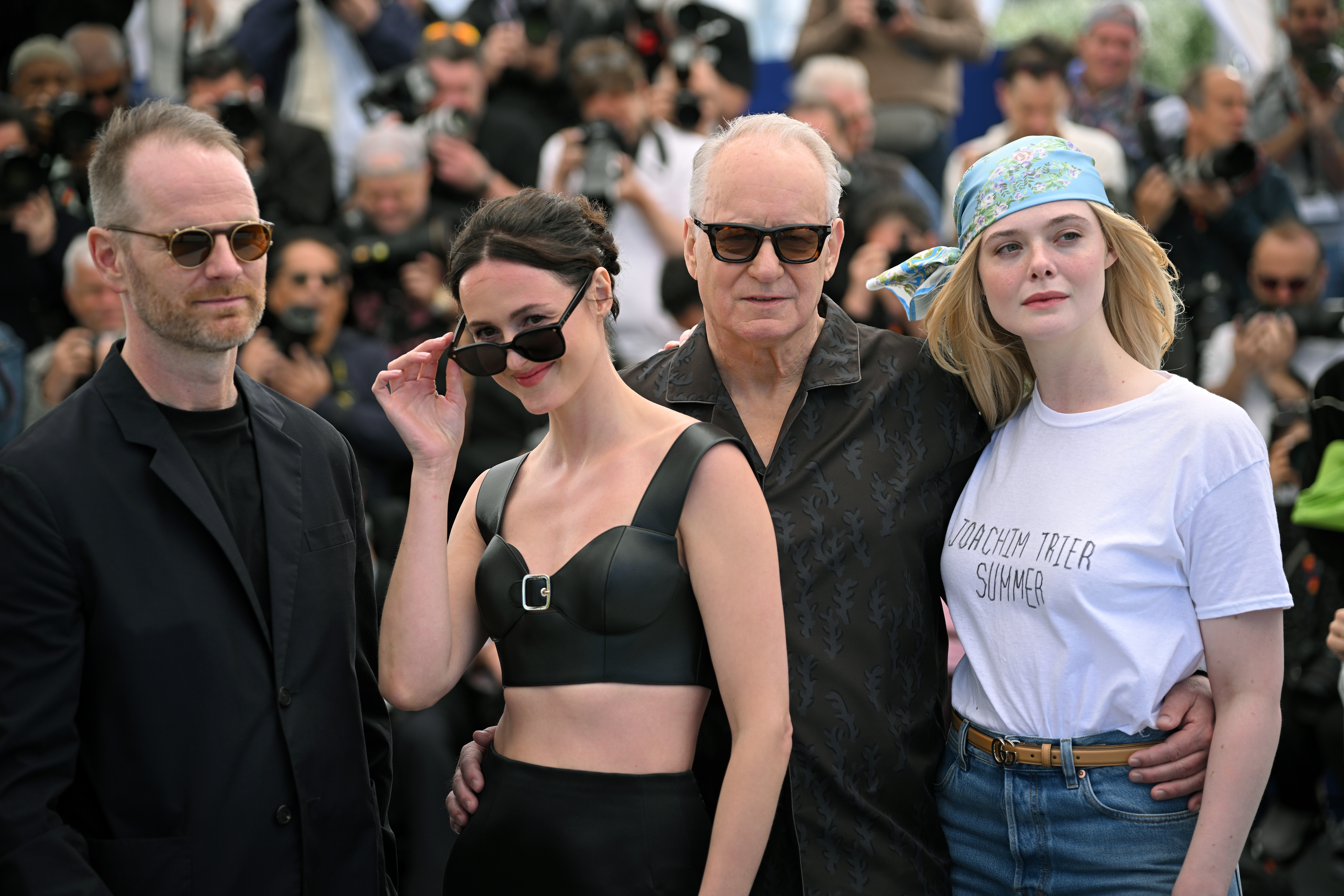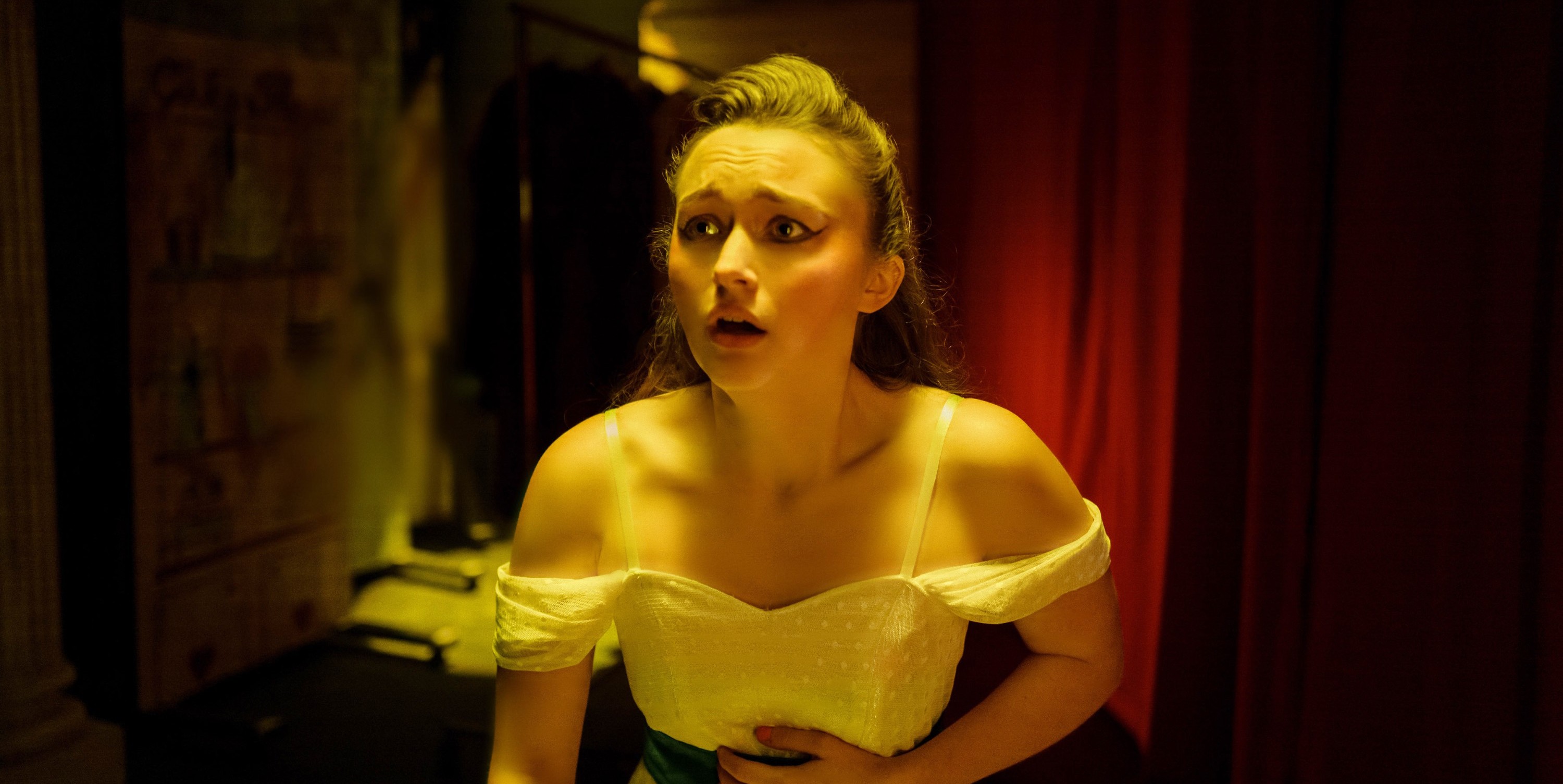On a shaded rooftop above the Croisette, Stellan Skarsgård deflected praise for his performance in Joachim Trier’s “Sentimental Value,” a rare Cannes consensus pick.
“Proud?” he told IndieWire quietly, rolling the word with audible distaste. “I’m not usually proud of things. I don’t know about that. Joachim’s way of working is very special, very beautiful, and quite brave. And it fucking works. That’s good.”
In the film, Skarsgård plays Gustav Borg, a once-lauded arthouse director who abandoned his wife and daughters in pursuit of his career. Fifteen years have passed since his last film, and longer still since his last success. Now, he’s written a screenplay exploring his emotional distance from his family and his mother’s suicide, centred on a role he wants his estranged daughter Nora, played by “The Worst Person in the World” star Renate Reinsve, to take on.
Cinephiles may recognise Gustav Borg’s type, the faded auteur with a loyal cinematographer and a career documentary about which he is quietly proud. But Skarsgård insists there was no single point of inspiration. “I’ve made about 150 films and worked with a lot of directors,” said Skarsgård. “There’s no particular one I based him on. He could be a composer, conductor, even a banker. It’s about a man whose work is his life. And that’s the problem: it competes with his family life.”
“He is conservative in a way and doesn’t have the tools to break the scar tissue that comes from not being present. As a father, he’s more traditional than me because I have no hierarchy with my kids,” he said, referring to his seven sons and one daughter, offspring that include three employees of the film and television industry, a doctor and the acting fraternity of Alexander, Gustaf, Bill and Valter. “I was very pleased when they became actors because we had at least found something in common that we could talk about,” he said with a smile. “But I don’t have a weaker relationship with my doctor son than with the others.”
“They’re doing different things and they’re very different kinds of actors. The important thing that they have understood is, ‘fuck the world’. It’s what you experience on the set that is important, and you can have a good experience on a small budget film or in a big budget film and you can become famous from it or be unknown after it.”
His son Alexander is also at Cannes, starring in Harry Lighton’s poignant and explicit BDSM romance “Pillion”, which the elder Skarsgård admits he is “dying to see”. Critics have called the performance revealing and brave, descriptors that make Skarsgård smile.
“Oh good,” he said. “I want him to be like that.”

The character of Gustav Borg is already being discussed as a possible first Oscar nomination for Skarsgård, who already has an Emmy nomination and a Golden Globe award for his performance in the HBO miniseries “Chernobyl.” Described by Trier as “one of the great Nordic actors of all time,” the role of Borg gives Skarsgård the rare opportunity to show the depth of his talent, creating a warm, complex, funny and deeply melancholy character.
“I like getting awards because I like,” he said, miming receiving a statue, “‘I liked what you did. Here, have an award.’ That’s fun.” He sips on a glass of water and looks over the bustle of the Croisette below. “I used to party all night at festivals and do press all day. I had an enormous appetite for that because I’m a very social being. But with age, you can’t go on like that. I have to go to bed early, and I’ve got to get up and produce something.”
Skarsgård has been acting since 1968, and in that time has seen the industry reshape itself around streaming, franchises, and finance. Over the last decade, he has been involved in some of the most financially successful film franchises, including “Dune,” the Marvel universe, and “Mamma Mia,” as well as series like “Andor” and “Chernobyl.” While his methods have changed little, the industry around him has transformed. When he considers how the industry has changed over his long career, Skarsgård singles out money as the root of all change.
“Everything is owned by investment companies now, and they need 15% return on their invested capital to be happy. Before, you could have a film studio and have 5% return of the capital, and they were happy too, but that doesn’t work anymore. So, you get those fucking big machines — like Netflix,” he said, citing the company that his “Sentimental Value” character makes his deeply personal film for.
“Since Netflix won the competition about streaming services, they don’t throw away money anymore,” he said. “They fired their head of film because he wanted to support artists, so now they’re starting to do reality shows instead,” he shrugged. “AT&T owns Time Warner, you know? What have they got to do with it? But I suppose I am good for business.”
Skarsgård reserves a special place for anyone who loves and cares about film, such as director Joachim Trier. In the past, Skarsgård has cited his favorite performances as those devoid of the process of acting. Trier, he said, is a director whose methods are “exemplary” when it comes to creating performances like these.
“What I want is the absolute truth in expression, and that cannot be planned,” said Skarsgård. “You can plan the surface of it, you can make a very beautiful performance of it, but it will be like a beautiful diamond; totally cold. It doesn’t have the irrationality of life,” he paused.

“But Joachim sees what you’re doing, even if you’re not doing it. He does a lot of takes, but he doesn’t push you in any direction. He lures out the experience, the reflection of the experience and the different kinds of emotions that are created in the moment, so you don’t know what’s going to come, and sometimes you surprise yourself. I used to say, ‘I’m very technical, but I want to be as good as an amateur when I act’. Like Björk, she’s an amateur, but [in Lars von Trier’s ‘Dancer in the Dark’], she’s got a rich inner life that pours out of her when she’s acting.”
It is this sense of on-set spontaneity and surprise that Skarsgård credits with keeping him excited and engaged with acting. This can come on any size of set, he said, it depends on the people with whom he’s working, and there are few people he’s worked with more often than the director of “Dancer in the Dark.”
“It’s the same with the other Trier, Lars von Trier,” he continued. “He doesn’t even block the scene. He says, ‘Good?,’ he starts, and things come. He’s not working in detail as much as Joachim, so they’re different in that way. Joachim has a much more solid script.”
A few days earlier at Cannes, on IndieWire’s Screen Talk podcast, Neon head and “Sentimental Value” producer Tom Quinn recalled a moment of Cannes infamy. Back in 2011, when he was working on Lars von Trier’s film “Melancholia,” which starred Skarsgård, his son Alexander, Kiefer Sutherland, Brady Corbet, Charlotte Gainsbourg, and Kirsten Dunst, Quinn believed it would be a breakout hit in the U.S. Then, came the infamous press conference, where von Trier declared, “I understand Hitler.” The comment, later apologized for and taken out of context, irreversibly damaged his reputation. “You can see the moment he says it,” Quinn recalled. “The actresses’ faces just fall. That was the moment it was all over.”
Since his debut in the late 1980s, von Trier has built one of cinema’s most viscerally powerful and galvanizing filmographies and built a partnership with Skarsgård that has included films such as “Breaking the Waves”, “Nymphomaniacs I and II,” and “Dogville.” In 2022, the director was diagnosed with Parkinson’s disease, and it seems unlikely he’ll direct again. These days, von Trier doesn’t pick up the phone, but the two still text.
“I mean, when Lars calls, I don’t even read the script,” said Skarsgård. “I know the staff that he’s going to work with, and I know what he makes will be good or it will be a totally unseen film,” he laughs. “Before he said to me, ‘Stellan, I know what kind of films I’m making, they’re the films that haven’t been made.’”
When it comes to the question of his own forthcoming projects, Skarsgård replies with a firm “no, nothing.” For someone who works as much as you, does that seem a little scary?
“Not as scary as some of the projects that I’m offered,” he replied with a smile.
“Sentimental Value” premiered at the 2025 Cannes Film Festival. Neon releases the film later this year.



